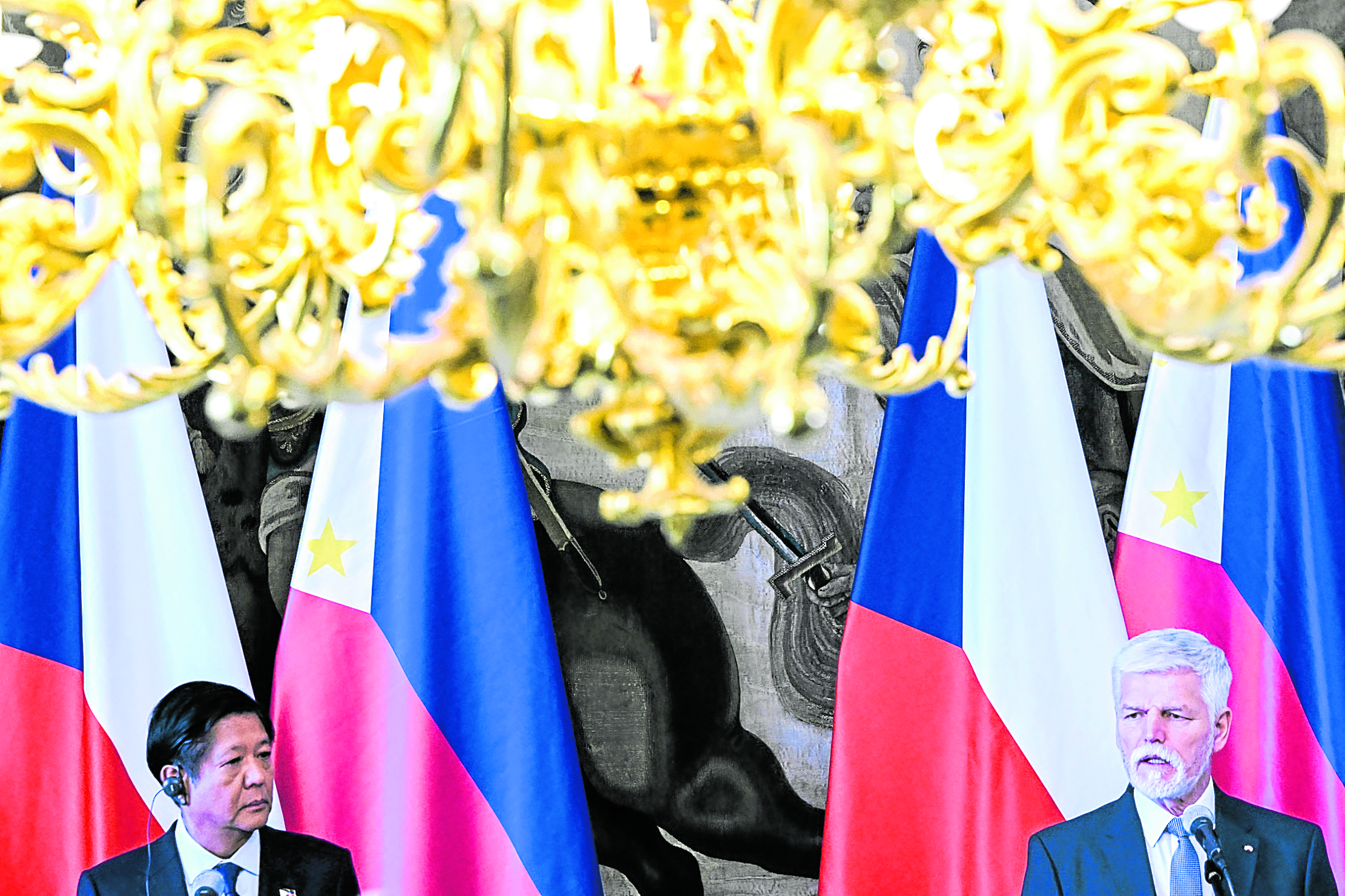
MUTUAL INTERESTS President Marcos and Czech Republic President Petr Pavel hold a press conference following arrival ceremonies on Thursday at Prague Castle in the Czech capital, kicking off Mr. Marcos’ three-day state visit. The two leaders discussed labor and other economic issues as well as the South China Sea. —AFP
PRAGUE — The Philippines and the Czech Republic have agreed to establish a labor consultation mechanism for a safe and orderly migration process for overseas Filipino workers (OFW) and stronger protection of their rights.
At a joint press conference following their bilateral meeting on Thursday morning, President Marcos and Czech President Petr Pavel announced the signing of the joint communique between the Philippines’ Department of Migrant Workers and the Czech Ministry of Labor and Social Affairs.
The mechanism is expected to benefit at least 7,026 Filipinos working here in industries like processing, automotive and appliance repair, manufacturing, information technology, real estate, health and wellness, and household service.
The capital Prague is home to the most number of Filipinos at 1,511, followed by South Moravia at 1,242, and Central Bohemia, 905.
The signing of the joint communique was one of the highlights of Mr. Marcos’ three-day state visit to Prague upon Pavel’s invitation.
The Czech Republic also announced that it had increased the yearly quota of OFWs allowed to enter the landlocked country—from 5,500 OFWs in January this year to 10,300 starting this May.
“The increase in the quota gives… another avenue for our overseas workers, who have traditionally (been) a very large part of our economy due to the very large contributions they make to our economy,” Mr. Marcos said during the bilateral meeting.
He added: “It’s not only in terms of the remittances that they send back … (but also) the good performance they have shown in their host countries. That has been a great advantage to the Philippines. The assimilation of our people to Czech society has become an important and fruitful one.”
The Czech Republic’s yearly quota on economic migration began in 2018, starting with 1,000 OFWs in 2018, 2,000 OFWs by 2021, and 2,500 from November 2022 onward. It eventually went up to 5,500 OFWs as of January this year.
Workforce shortage
For his part, Pavel signified his “appreciation” for the joint communique, noting that “the labor market in the Czech Republic suffers from shortage in the workforce, (while) the Philippines ranks among the top countries that send top, qualified, highly skilled workers to us.”
“I’m glad that the Philippines is interested in upskilling,” he added.
His country has “also worked on legal mechanisms that would facilitate the work of such workers in our country. They also have to enjoy equal standing and protection of rights just like all other (workers,” Pavel said.
Aside from stronger protection for OFWs, Mr. Marcos and Pavel discussed the potential in increased bilateral trade and investments between the Philippines and the Czech Republic.
‘Increased engagement’
The two state leaders “explored various opportunities for future partnerships in trade and investment, agriculture, green economy and renewable energy, space and aerospace, education, tourism, defense, cybersecurity, and labor,” the Presidential Communications Office (PCO) said in a statement.
Mr. Marcos and first lady Liza Araneta Marcos were accorded arrival honors Thursday morning at the Prague Castle, where they were welcomed by Pavel.
Joining the President in the bilateral meeting were Foreign Secretary Enrique Manalo, Trade Secretary Alfredo Pascual, PCO Secretary Cheloy Velicaria-Garafil, Speaker Martin Romualdez, and Senate President Juan Miguel Zubiri.
Mr. Marcos also met with Czech Prime Minister Petr Fiala, Senate President Miloš Vystrčil, and Speaker of the Chamber of Deputies Markéta Pekarová Adamová at their respective offices on Thursday afternoon.
President Marcos expressed optimism about attracting more Czech traders and investors to do business with the Philippines “as a result of this increased engagement between our respective business sectors.”
Agri minister visiting
He is looking forward to the second meeting of the Philippines-Czech Republic Joint Committee on Economic Cooperation in Manila later this year, he added.
Pavel said Czech Agriculture Minister Marek Výborný will visit Manila next year to establish cooperation on food security, with a delegation of Czech businessmen joining him to offer “specific, particular plans for future cooperation with the Philippines.”
They have “companies that are involved in defense industry, manufacturing, farming and agriculture, science, technology, energy sector, and the power sector,” he said, adding that cooperation between the two countries will include technology transfer and cooperation, expertise, and finance.
Tourism pitch
Mr. Marcos’ visit to the Czech Republic is the President’s 25th foreign trip since assuming office in 2022 and his sixth this year, following visits to Brunei Darussalam, Vietnam, Australia, and Germany.
Recalling Fiala’s visit to the country last year that saw the launch of the book, “Kaibigan-Přátelé: Czech-Philippine Cultural and Diplomatic Dialogue” in Malacañang, the President said it showed the vibrant ties being maintained by the two nations.
Tourism, Mr. Marcos noted, could be another area of cooperation since the Czech Republic has become a significant tourist destination for Filipinos. The two countries, he said, are also discussing collaboration in infrastructure development, and student and scientific exchanges.
READ: Czech companies exploring business opportunities in PH
In his meeting with Adamová, Mr. Marcos cited the establishment of a Philippines-Czech Republic Parliamentary Friendship Group in the House of Representatives that, he said, is meant to further strengthen interparliamentary cooperation between the two countries and pursue enhanced defense and economic cooperation.
The President also sought the Czech Republic’s support for a Philippines-European Union Free Trade Agreement to promote trade and investment. (See related story on Page A4) INQ